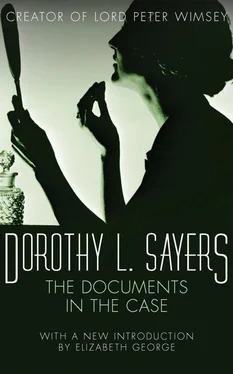Dorothy Sayers - The Documents in the Case
Здесь есть возможность читать онлайн «Dorothy Sayers - The Documents in the Case» весь текст электронной книги совершенно бесплатно (целиком полную версию без сокращений). В некоторых случаях можно слушать аудио, скачать через торрент в формате fb2 и присутствует краткое содержание. Жанр: Классический детектив, на английском языке. Описание произведения, (предисловие) а так же отзывы посетителей доступны на портале библиотеки ЛибКат.
- Название:The Documents in the Case
- Автор:
- Жанр:
- Год:неизвестен
- ISBN:нет данных
- Рейтинг книги:5 / 5. Голосов: 1
-
Избранное:Добавить в избранное
- Отзывы:
-
Ваша оценка:
- 100
- 1
- 2
- 3
- 4
- 5
The Documents in the Case: краткое содержание, описание и аннотация
Предлагаем к чтению аннотацию, описание, краткое содержание или предисловие (зависит от того, что написал сам автор книги «The Documents in the Case»). Если вы не нашли необходимую информацию о книге — напишите в комментариях, мы постараемся отыскать её.
The Documents in the Case — читать онлайн бесплатно полную книгу (весь текст) целиком
Ниже представлен текст книги, разбитый по страницам. Система сохранения места последней прочитанной страницы, позволяет с удобством читать онлайн бесплатно книгу «The Documents in the Case», без необходимости каждый раз заново искать на чём Вы остановились. Поставьте закладку, и сможете в любой момент перейти на страницу, на которой закончили чтение.
Интервал:
Закладка:
‘Yes,’ he said, ‘we’ve rather got past that stage now, haven’t we? I’ve got one or two books that I think might be useful to you, as giving the point of view and all that. Shall I send them over?’
I said it was very good of him (not expecting much from it), and, by way off a leg-pull, asked him what he thought of relativity.
‘Why, I’m rather grateful to it,’ said he, ‘it makes my job much easier. We’ll have a chat some day and go into it. I must be going now.’
He oozed competently away, and the party rambled on till I could stand it no longer and rambled out into the passage, where I met Harrison.
‘Hullo!’ said he, ‘come and have a pipe in the studio. And a whisky-and-soda or something. Better than tea.’
I went in, expecting him to talk Art, but he didn’t. He just sat smoking in silence and I did likewise. I had an idea I ought to say something to him, but nothing presented itself. If I had said what I felt like saying, he would have been angry with me.
So much for social life in Suburbia. I had a letter from Jim on Wednesday. He is thoroughly enjoying himself in Germany, and begs to be remembered to you. He is reading hard — or so he says — and he’d jolly well better, the young cub, since if he fails in his tripos there’s no money to give him another year there and he’ll have to go as an apothecary’s apprentice or something. I haven’t looked up Cynthia or the Brierleys yet, but I will pull myself together and do it before long.
Love to everybody. Wish I was up north with you among the burrns and birrds. Give the Guv’nor my love. Has he had good sport? I suppose the hills are beginning to look a bit grim again now, bless their granite hearts. Remember me to all the artist fraternity.
Ever and ever yours, funny-face, old dear. I’d like to see your cheery grin now and again. I must be damned fond of you — sometimes it positively puts me off my stroke. Damned inconvenient. I shall really have to see about this marriage business. I cannot have my work interrupted in this way.Yours deeply injured Jack
10. Agatha Milsom to Olive Farebrother
15, Whittington Terrace, Bayswater 15.10.28
Dearest Olive,
I am so sorry I have not written for such a long time, but I have been feeling anything but fit. This household is most trying to live with, and I really feel that in my present nervous condition I am hardly fit to cope with my work here. I have been to Dr Trevor and put the whole situation very fully and carefully before him, and he agrees that I certainly ought not to be subjected to so much emotional strain. On the other hand, I know poor Mrs Harrison does cling to me so much for sympathy and support that it seems almost wicked not to hang on if I can possibly manage it. She has no one else to confide in at all, and I do at least feel that here I am being of real use to somebody. Dr Trevor says that if only I can lose sight of my own difficulties in helping her with hers, it will be good for me to make the effort, provided I do not let the atmosphere of the house get on my nerves. I have started a little exercise on Coù lines. Every morning I say to myself: ‘I am cool, strong, confident,’ twenty times, and at night I say: ‘I am satisfied and at peace,’ also twenty times. Dr Trevor thinks these are quite good phrases to say.
I did hope, a few days ago, that the difficulty was going to solve itself. Mrs Harrison announced that she was going to take up office work again. The idea of it seemed to brighten her up tremendously, and I think it would be the best thing she could do. But, of course, the Bear played his old trick again. When she first announced her decision, he pretended to agree, and said she could do as she liked, so was awfully pleased, and rang up one of the people at her old office to see if they had a vacancy there. As it happened, they had, and she practically arranged to start work next week. Then Mr Bear started off. ‘All right? Well, I suppose it is all right if you think so. But don’t you think it’s a trifle hard on me, my dear, having a wife out all day, fagging herself to death in an office and coming home fit for nothing? I give you a good home, and I rather expected, or hoped, you would like to make it a home for me to come back to. That is the usual idea, isn’t it? But I suppose the modern woman thinks differently about these things. If hotel life is your notion of happiness you ought to go and live in America.’
It is too bad to work upon the poor girl’s feelings in that selfish way. She tried to reason with him, but, of course, the end was that she made herself perfectly sick with crying, and wrote and told the people that she couldn’t manage to take the job after all. And now he goes about saying it’s a pity she can’t find something better to do with herself than reading trashy novels all day. I spoke up. I said, ‘Mr Harrison, excuse me, but you ought not to speak to your wife like that. She gave up the work she wanted to do, entirely to please you, and I think you ought to consider her a little more and yourself a good deal less.’ I daresay he wasn’t best pleased, but I thought it my duty to say it. I felt most terribly exhausted after this trying scene. It is such a drain upon one’s personality, coping with outbreaks of this kind. One is giving, giving, all the time. I am asking Dr Trevor to prescribe me a tonic. A curious feature of my malady at the moment is a craving for shrimps. Our fishmonger keeps very good ones, but sometimes I have to go quite a long way to get them, because I am afraid he will think it funny if I buy shrimps every day.
I am sure I don’t know what we should do if it were not for Mr Lathom. He often drops in of an evening now and cheers us up immensely. The Bear is always dragging the poor man off into his studio, as he calls it, to twaddle about art, but Mr Lathom has most delightful manners and puts up with it heroically. He thinks my scarf-patterns and stocking-tops show great talent, ‘a very good sense of design’. He is a real artist, so I am sure he wouldn’t say so if he didn’t think it.
We do not see much of the objectionable Mr Munting, I am glad to say. He often doesn’t come home till very late. You never know what these men are after. It is a good thing that he shares the maisonette with Mr Lathom, who I am sure would not allow any undesirable goings-on under our roof.
I hope darling Joan is quite strong again now. Give her my love, and say I have started on the scarf. I am doing a pattern of purple and white clematis, which will be very chic, I think.Your loving sister, Aggie
11. John Munting to Elizabeth Drake
15a, Whittington Terrace 19.10.28
Damn it all, yes, Bungie — I suppose you are right. Our ideas are always ahead of our actions, or rather, askew to them, and we move lop-sided, like a knight on a chess-board. We get somewhere, even if it isn’t the place we thought we were aiming for. By the time the next generation has come along, the ideas which were new and strange to us have become part of its habitual commonplace. It goes straight along them, even when it imagines it is rebelling against them.
And after all, this business of imagining that one is one kind of thing and being actually another — we all do it, all the time, so why shouldn’t whole nations and periods do it? Have you read J. D. Beresford’s Writing Aloud , by the way? It is enormously fascinating, and I delight in the bit where he tells how, in his callow youth, he had a ‘passionate impulse’ to ‘save’ a young prostitute he had talked to, and then prayed desperately to be delivered from the sin of hypocrisy and be made single-hearted and all that — only to be delighted, later on in life, with the discovery that he was ‘not one person but fifty’. One imagines — one dramatises oneself into the belief that one is going one way, and lo and behold! the path ‘gives itself a little shake’ like the one in Alice and one finds oneself walking at the front door again.
Читать дальшеИнтервал:
Закладка:
Похожие книги на «The Documents in the Case»
Представляем Вашему вниманию похожие книги на «The Documents in the Case» списком для выбора. Мы отобрали схожую по названию и смыслу литературу в надежде предоставить читателям больше вариантов отыскать новые, интересные, ещё непрочитанные произведения.
Обсуждение, отзывы о книге «The Documents in the Case» и просто собственные мнения читателей. Оставьте ваши комментарии, напишите, что Вы думаете о произведении, его смысле или главных героях. Укажите что конкретно понравилось, а что нет, и почему Вы так считаете.












